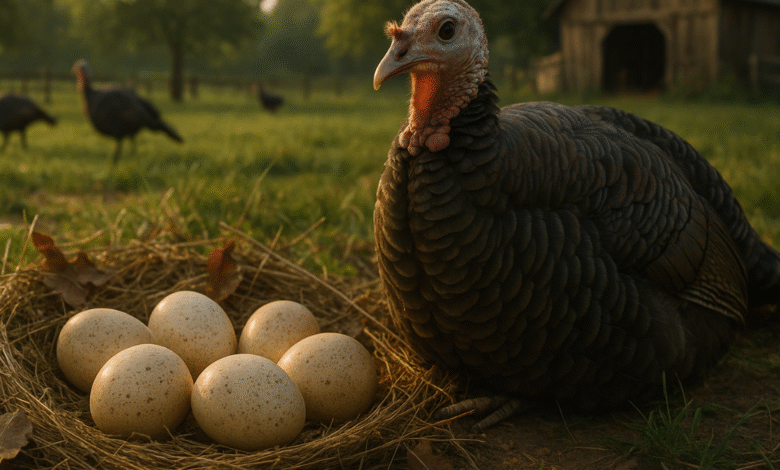Do Turkeys Lay Eggs? Everything You Need to Know

Do turkeys lay eggs? Yes, they do—but not like chickens. Learn how often turkeys lay, what their eggs look like, why they’re rare, and whether turkey eggs are good to eat.
When people think of turkeys, their minds often drift to holiday dinners, roasted birds, or even the wild flocks spotted in rural areas. But one common question many ask—especially those who keep backyard poultry—is: do turkeys lay eggs? The answer is yes, they absolutely do. Yet their egg-laying habits, frequency, and uses are not as widely understood as those of chickens.
In this article, we’ll dive into everything you need to know about turkey egg production: how often they lay, what the eggs look like, why they’re not commonly sold in grocery stores, and whether or not they’re good for eating. By the end, you’ll not only know the facts but also gain a deeper appreciation for these fascinating birds.
Understanding the Basics of Turkey Egg Laying
Turkeys are indeed egg-laying birds, just like chickens, ducks, and quail. However, their reproductive cycle is much different from chickens. Chickens can produce an egg almost daily under ideal conditions, whereas turkeys are seasonal layers.
A hen turkey typically begins laying in her first spring after reaching maturity. Most turkeys start producing eggs at around 7 months of age, though the exact timing depends on breed, diet, and environmental conditions. Unlike chickens that lay year-round (with some decrease in winter), turkeys have a specific laying season, generally from early spring through summer.
In terms of output, a turkey may produce anywhere from 80 to 120 eggs per year—significantly fewer than the 250–300 eggs that chickens often produce annually. This naturally explains why turkey eggs are less common on the market.
What Do Turkey Eggs Look Like
Turkey eggs are noticeably different from chicken eggs in appearance. They are larger, weighing about 80 to 90 grams each (almost twice the size of a standard chicken egg). Their shells are cream-colored or light brown, often speckled with darker brown spots.
The shape of turkey eggs is also slightly pointier at one end compared to the more rounded chicken eggs. Because of their size, they contain more yolk relative to egg white, which gives them a richer texture when cooked. Many chefs who have tried turkey eggs describe them as creamier, with a deeper flavor.
A side-by-side comparison between turkey and chicken eggs makes these differences clear.
| Feature | Chicken Egg | Turkey Egg |
|---|---|---|
| Average Weight | 50–60 g | 80–90 g |
| Shell Color | White/Brown | Cream/Spotted |
| Annual Production | 250–300 | 80–120 |
| Taste | Familiar | Richer, creamier |
How Often Do Turkeys Lay Eggs
Unlike chickens, which can lay nearly every day during peak seasons, turkeys follow a different rhythm. A turkey hen usually lays one egg every 24 to 48 hours during her laying period. Once she accumulates a clutch of 10 to 15 eggs, she often becomes broody—meaning she wants to sit on the eggs to hatch them.
This behavior is part of what limits commercial turkey egg production. While chickens have been bred for generations to prioritize consistent laying, turkeys still retain much of their natural instinct to hatch their own young.
It’s also worth noting that lighting conditions, diet, and overall health play important roles in determining how frequently a turkey lays. Farmers who want to maximize egg production sometimes use artificial lighting to extend daylight hours, but even then, turkeys will not match the high frequency of chicken layers.
Why Don’t We See Turkey Eggs in Stores
If turkeys lay eggs, why aren’t we buying cartons of turkey eggs at the supermarket? There are several practical and economic reasons.
First, turkeys produce far fewer eggs than chickens, making large-scale production inefficient. With chickens laying nearly three times as many eggs per year, it’s simply cheaper for farmers to focus on chicken eggs for mass consumption.
Second, turkeys are primarily raised for meat, not eggs. Their large body size and slower maturity mean they are more valuable as a source of meat rather than egg layers. A chicken reaches maturity quickly and begins producing eggs in abundance, while a turkey takes longer to raise and consumes more feed in the process.
Third, the strong broody instincts of turkeys mean they often stop laying once they decide to sit on a clutch. In commercial egg operations, consistency is key—and turkeys just aren’t as reliable as chickens.
Finally, consumer demand for turkey eggs is minimal. Since most people are accustomed to chicken eggs, the niche market for turkey eggs remains small, with most being enjoyed by small-scale farmers or specialty chefs.
Are Turkey Eggs Good to Eat
Yes, turkey eggs are entirely edible and quite delicious. In fact, many people who have tried them report that they are richer and creamier than chicken eggs. Their larger size also makes them excellent for baking, as a single turkey egg can replace one and a half chicken eggs in most recipes.
Nutritionally, turkey eggs are similar to chicken eggs, containing protein, healthy fats, vitamins, and minerals. They tend to have slightly higher cholesterol levels, but they also provide more of certain nutrients such as folate and iron.
Despite these benefits, their scarcity makes them more of a specialty food than a staple. Some gourmet restaurants occasionally feature turkey eggs in unique dishes, but you’re unlikely to find them in everyday cooking.
Turkey Egg Laying in the Wild vs Domestication
In the wild, turkeys follow their natural seasonal cycles. Wild hens usually lay a clutch of 10 to 15 eggs in a hidden nest on the ground. They’ll sit on them for about 28 days until they hatch. Wild turkey hens are extremely protective and attentive mothers, leading their poults (baby turkeys) soon after hatching.
Domesticated turkeys, however, are often raised in controlled environments. Farmers may collect their eggs to hatch in incubators or allow the hens to brood naturally. While domesticated turkeys retain the ability to lay eggs, selective breeding has prioritized meat production over egg output.
Challenges of Raising Turkeys for Eggs
Raising turkeys for eggs comes with unique challenges compared to raising chickens. For starters, turkeys require more space. They are larger birds that need room to roam, forage, and nest comfortably.
Another challenge is their feed consumption. A turkey consumes significantly more feed than a chicken, which drives up the cost of egg production. When this cost is combined with their lower laying frequency, turkey eggs become expensive to produce.
Health management is also more demanding. Turkeys can be more sensitive to diseases, particularly respiratory issues. Farmers raising turkeys for eggs must be diligent with biosecurity, clean housing, and proper nutrition.
Because of these challenges, most people who raise turkeys for eggs do so as a hobby or for specialty markets, rather than large-scale commercial purposes.
Cultural and Historical Perspectives on Turkey Eggs
Historically, turkey eggs were consumed more often, especially before industrial chicken farming became widespread. In some rural communities, farm families collected turkey eggs for their own use or sold them locally.
Today, turkey eggs have become somewhat of a novelty. Food enthusiasts and small farmers appreciate their uniqueness, and in certain regions, they are still enjoyed as part of traditional diets.
One interesting note is that turkey eggs are more commonly found in some European and Middle Eastern cultures, where small-scale farming traditions continue to value them.
“Turkey eggs are like a hidden gem in the poultry world—rare, rich, and surprisingly delightful to those who get to try them.”
FAQs About Turkey Eggs
Do turkeys lay eggs like chickens?
Yes, turkeys lay eggs, but far fewer than chickens and only during specific seasons.
How many eggs does a turkey lay in a year?
A turkey hen usually lays between 80 and 120 eggs per year, compared to 250–300 from chickens.
Are turkey eggs edible?
Absolutely. Turkey eggs are safe to eat and are richer and creamier than chicken eggs.
Why don’t we see turkey eggs in grocery stores?
They are rare because turkeys lay fewer eggs, cost more to raise, and are primarily farmed for meat.
Do turkeys need special care for laying eggs?
Yes, they require more space, feed, and health management compared to chickens, making egg production less efficient.
Conclusion
So, do turkeys lay eggs? Yes—they certainly do. But while turkey eggs are edible, nutritious, and even richer in flavor than chicken eggs, they are not common in markets due to economic and practical reasons. Turkeys lay fewer eggs, consume more feed, and are mostly raised for meat.
For backyard farmers or curious food lovers, turkey eggs represent a rare treat worth experiencing at least once. They remind us that while chickens may dominate the egg industry, other birds like turkeys have fascinating and delicious contributions to offer.





